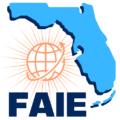
Professional Learning Communities
FAIE’s Professional Learning Communities are the new wave of mentorship. Bringing together international educators at all levels and intersections of the profession to learn from each other in a flexible, action-oriented way.
What is a Professional Learning Community (PLC)?
A PLC helps network groups of professionals to learn from practice.
Through regular meetings using structured protocols, PLC teams conduct cycles of collective inquiry and action research to achieve better results for the students they serve. PLCs operate under the assumption that the key to improved learning for students is continuous job-embedded learning for educators.
What is the goal?
The main goal is to improve an element of your context that you identify as needing improvement. A secondary goal is collaborative learning.
In a PLC, collaboration represents a systematic process in which educators work together interdependently in order to impact their practice in ways that will lead to better results for their students, their team, and their schools.
As an added bonus, the work you will do in a PLC makes for great collaborative articles or conference presentations!
What is the time commitment?
That is really up to your PLC team.
Groups will meet once each month for one year. The work you do will be ongoing within your own context.
Who can join?
Anyone! We will build PLC teams based on who joins the program.
At any stage of your career and at any level, you can be a member of a PLC team. After identifying a goal in their context, every person in a PLC contributes equally to the group in the shared process inquiry.
How does it work?
There are two key elements:
Inquiry Cycles: members will not simply read and learn a new strategy to solve the issues they identify. Instead, we will work to implement conditions for a learning environment in which innovation and experimentation continue to bring lasting improvement
Action Research: Action Research is a method of systematic inquiry into your own practices and your institution. You will look at the findings of other researchers, develop actions and interpret the results, attempting to find improvements in the current practices of your own context.
Want to learn more?
Contact the PLC Coordinator, Michael Kung at mkung@ufic.ufl.edu
